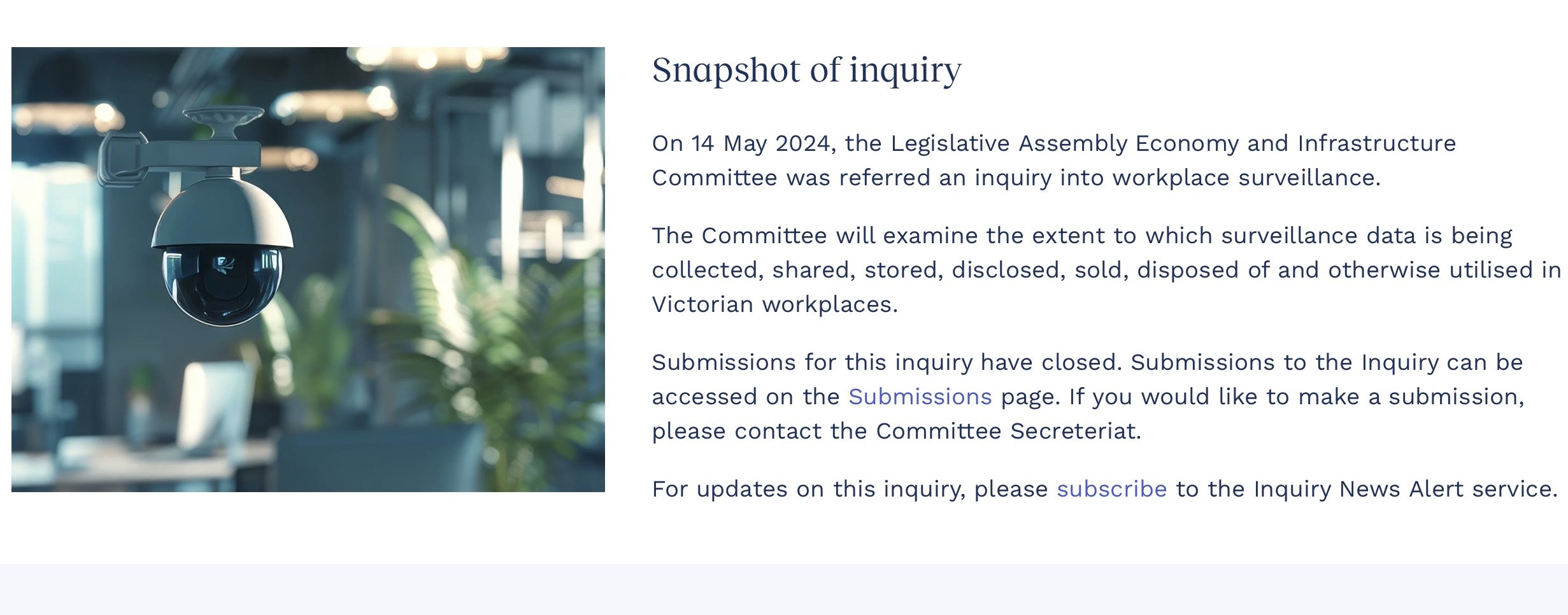Workplace surveillance - technology, privacy and the law
The Victorian Parliament’s inquiry into workplace surveillance is examining “the extent to which employers collect, share, store, sell, disclose and dispose of surveillance data, the role of artificial intelligence, and whether there should be dedicated State workplace surveillance laws”.
The inquiry conducted public hearings this year, accepting 42 submissions, including one from the IEU, and is due to report back to parliament in May next year.
Workplace surveillance includes email monitoring, keyboard activity trackers, cameras and videos that monitor attentiveness, and software that tracks what apps and websites an employee visits.
It needs to be discussed because, in Victoria, there are no specific laws governing breaches of employee privacy by employers.
Submissions to the inquiry considered potential law reform, data breaches, the impact of workplace surveillance on workers' physical and mental safety, the effects on workers' rights and the balance of power between employers and workers.
Melbourne University professor John Howe says cheaper technology and more remote work have caused an “explosion” in workplace data collection and widespread misuse of surveillance and automated decision-making.
Research by Gartner, a tech research firm from the US, says the number of large employers using tracking to monitor their employees has doubled since the beginning of the COVID-19 pandemic.
In Australia, a 2021 study by Herbert Smith Freehills found that 91% of employers monitor their remote employees' locations using technology.
Australia’s inadequate laws
In his submission to the inquiry, Howe said that current State and Federal regulations provide "inadequate" protections for workers.
And regulations are necessary because a study conducted by Howe and two colleagues found that less than 5% of employment Agreements contain surveillance protections for workers.
Peter Leonard, Professor of Practice at UNSW Business School, saying Australian surveillance laws are a “bit of a mess”, as only NSW and the ACT have legislation that specifically address workplace surveillance, while in other jurisdictions existing regulations are “not well understood” by employers, employees, and even lawyers themselves.
Leonard says workplace surveillance can be a “highly intrusive practice”, and laws around the country need to be “harmonised” to balance the needs of employers with the privacy of employees.
He believes that employers should have to provide advance notice to their employees about “any monitoring that will take place, including how that will occur, what devices it will apply on, and possible issues associated with excessive monitoring”.
“Hybrid working changed everything. The laws were all developed back in the early 2000s. They need an overhaul,” Leonard says.
“Nobody’s had time to properly focus on the surveillance issue … there’s unfair and excessive invasive surveillance happening, and we need to do something about it.”
Victorian Parliament Inquiry into Workplace Surveillance
Union submissions to the workplace surveillance inquiry
Four construction unions made a group submission to the inquiry, providing examples of health and safety representatives using provisional improvement notices to address surveillance issues.
Earlier this year, two ETU members received written warnings for behaviour recorded on site surveillance. The employer claimed the cameras took photos every five minutes, but the union discovered the cameras were running continuously and that subcontractors had access to the live feed without workers' consent. The union then demanded the cameras be covered, threatening a stop-work order if their concerns were not addressed in 24 hours. The employer complied.
The Victorian Trades Hall Council (VTHC) called for the creation of a standalone Privacy In Working Life Act “placing limits on the use of optical, audio, visual, digital and location tracking surveillance against workers”.
The Act would ban workplace surveillance in non-work-related areas and outside of working hours, prohibit undisclosed resale of workers’ personal data, create "mandatory notice, disclosure and consultation requirements for introducing or expanding surveillance in the workplace" and ensure workers have access to any data collected about them at work by their employers.
AI
In May this year, an ACTU submission to the Senate Select Committee on Adopting Artificial Intelligence sought a "total ban" on using AI to hire, fire, discipline or promote workers, accusing employers of introducing the technology without consultation and deploying it to police productivity.
The ACTU pointed out that US grocery chain Whole Foods was applying AI to "interpret employee data in its stores to predict their 'risk' of unionisation” and said that AI "could also be used during the hiring process to discriminate against workers more likely to join their union".
ACTU assistant secretary Joseph Mitchell said, "the risks are clear: workers are being subjected to unreasonable unblinking surveillance, being hired and fired by algorithm, having their creative output stolen by companies, and being discriminated against by bosses' bots".
The Big Brother view
Susannah Copson is legal and policy officer at UK civil liberties non-profit campaign group Big Brother Watch.
She says the rise of workplace surveillance “overlooks the profound human cost of intrusive surveillance technologies, which compromise employees’ well-being, job satisfaction and trust”.
“These tools are not just invasive. They’re unreliable and discriminatory, turning the workplace into a minefield of stress and exclusion. It’s widely recognised that women and people from ethnic minority backgrounds tend to bear the brunt of surveillance tech.
“Earlier this year, a gig economy worker received a settlement from Uber Eats after arguing that racially biased facial recognition checks had barred him from accessing the app, cutting off his ability to work.
“The risks posed by invasive and flawed technology far outweigh any illusory gains in productivity or security, undermining trust and fairness in the workplace for the appearance of control.
“The future of work should not be defined by the pervasive oversight of Big Brother-style technology. While some workers have successfully resisted invasive monitoring, these victories, though important, are not enough to halt the trend. The problem is systemic; without safeguards, companies will continue to introduce excessive surveillance, and workers will pay the price.”


